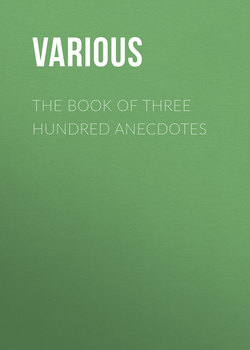Читать книгу The Book of Three Hundred Anecdotes - Various - Страница 8
DINNERS
ОглавлениеBannister.—Charles Bannister dining one day at the Turk's Head Tavern, was much annoyed by a gentleman in the adjoining box, who had just ordered fish for dinner, and was calling on the waiter for every species of fish sauce known to the most refined epicure. "Waiter," said he, "bring me anchovy sauce, and soy; and have you got Harvey's? and be sure you bring me Burgess's;—and waiter—do you hear?—don't omit the sauce epicurienne." How many more he would have enumerated it is difficult to say, had not Bannister stepped up to him, and bowing very politely, said, "Sir, I beg your pardon for thus interrupting you, but I see you are advertised for in the newspaper of this morning." "Me, sir, advertised for!" exclaimed the gentleman, half petrified with surprise; "pray, sir, what do you mean?" Bannister, taking the paper, pointed to an advertisement addressed to "The Curious in Fish Sauces." The gentleman felt the rebuke, sat down, and ate his dinner without further ceremony.
A Christmas Pudding Extraordinary.—When the late Lord Paget was ambassador at Constantinople, he, with the rest of the gentlemen who were in a public capacity at the same court, determined one day when there was to be a grand banquet, to have each of them a dish dressed after the manner of their respective countries; and Lord Paget, for the honour of England, ordered a piece of roast beef and a plum pudding. The beef was easily cooked, but the court cooks not knowing how to make a plum pudding, he gave them a receipt:—"So many eggs, so much milk, so much flour, and a given quantity of raisins; to be beaten up together, and boiled so many hours in so many gallons of water." When dinner was served up, first came the French ambassador's dish—then that of the Spanish ambassador—and next, two fellows bearing an immense pan, and bawling, "Room for the English ambassador's dish!" "Confound my stupidity!" cried his lordship; "I forgot to tell them of the bag, and these stupid scoundrels have boiled it without one; and in five gallons of water too. It will be good plum broth, however!"
Dr. Kirwan, the celebrated Irish chemist, having one day at dinner with him a party of friends, was descanting upon the antiseptic qualities of charcoal, and added, that if a quantity of pulverised charcoal were boiled together with tainted meat, it would remove all symptoms of putrescence, and render it perfectly sweet. Shortly afterwards, the doctor helped a gentleman to a slice of boiled leg of mutton, which was so far gone as to shed an odour not very agreeable to the noses of the company. The gentleman repeatedly turned it upon his plate, without venturing to taste it; and the doctor observing him, said, "Sir, perhaps you don't like mutton?" "Oh, yes, doctor," he replied, "I am very fond of mutton, but I do not think the cook has boiled charcoal enough with it."
When the Archbishop of York sent Ben Jonson an excellent dish of fish from his dinner table, but without drink, he said,—
"In a dish came fish
From the arch-bis-
Hop was not there,
Because there was no beer."
Poor-Man-of-Mutton is a term applied to a shoulder of mutton in Scotland after it has been served as a roast at dinner, and appears as a broiled bone at supper, or at the dinner next day. The late Earl of B., popularly known as "Old Rag," being indisposed at a hotel in London, one morning the landlord came to enumerate the good things in his larder, in order to prevail on his guest to eat something, when his lordship replied, "Landlord, I think I could eat a morsel of a poor man;" which, with the extreme ugliness of his lordship's countenance, so terrified the landlord, that he fled from the room and tumbled down stairs, supposing the earl, when at home, was in the habit of eating a joint of a vassal, or tenant when his appetite was dainty.
Swift.—A gentleman, at whose house Swift was dining in Ireland, after dinner introduced remarkably small hock glasses, and at length, turning to Swift, addressed him,—"Mr. Dean, I shall be happy to take a glass of hic, hæc, hoc, with you." "Sir," rejoined the doctor, "I shall be happy to comply, but it must be out of a hujus glass."
Swift, having a shoulder of mutton too much done brought up for his dinner, sent for the cook, and told her to take the mutton down, and do it less. "Please your honour, I cannot do it less." "But," said the dean, "if it had not been done enough, you could have done it more, could you not?" "Oh, yes, sir, very easily." "Why, then," said the dean, "for the future, when you commit a fault, let it be such a one as can be mended."
